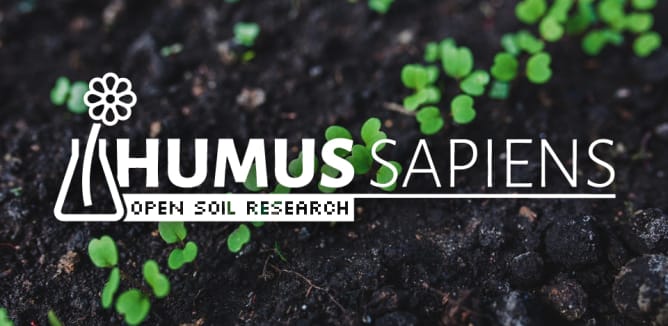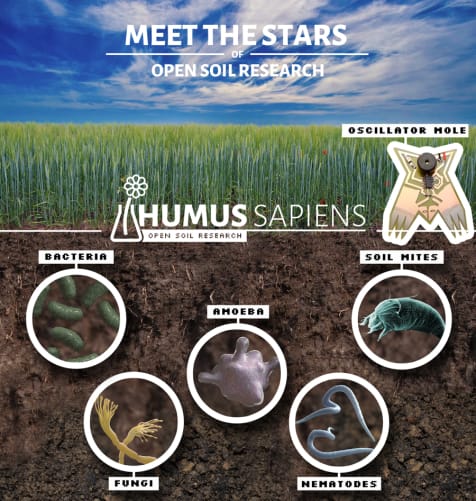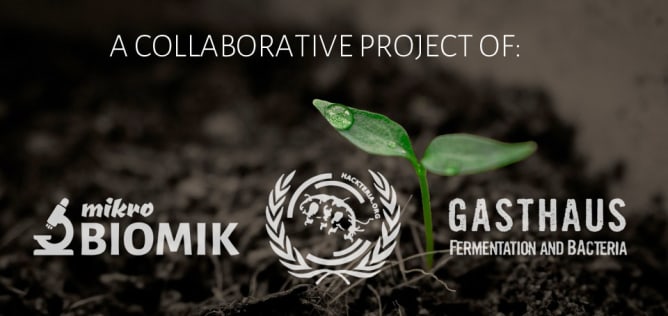Soil Is Life
We’re not talking about hummus, the Arabic chickpea dip – we’re talking about HUMUS the stuff that makes the chickpeas grow. With this crowdfundig campaign, you can become part of a ground-breaking «open soil research» project.
We believe diversity is the key to creativity and innovation. The goal of HUMUS SAPIENS is to establish an international network of soil and permaculture enthusiasts, coming from diverse professional backgrounds: scientists, biohackers, artists, makers, educators, ecologists and farmers will collaborate to create new strategies and tools for the study of soil ecology and catalyse further research by openly sharing all results.
The Global Hackteria Network, Gasthaus: Fermentation and Bacteria and the mikroBIOMIK society join forces to bring citizen science and the hacker spirit into soil ecology.
Some of the questions we like to ask:
- what is humus anyway?
- what is the difference between conventional and biological farmed soil?
- how can we measure soil health with low-cost and open-source technology?
- how does microbial diversity influence plant growth?
- can we measure the impact of using chemicals (e.g. glyphosate) on our soil?
- how can we share our knowledge efficiently?

The funding we collect will be used to:
#1_ Kick-off the HUMUS SAPIENS initiative and build a network of soil enthusiasts for long-term collaborative research.
#2_ Organize the «Hackteria soil retreat», where brilliant minds with highly diverse professional backgrounds come together to work on DIY methodologies and develop workshop concepts on the topic of soil ecology. The event will take place from 04.-06.05.18 in the woods near Schaffhausen. ~ http://randelab.ch ~ Special Guests: Lucy Patterson & Urs Gaudenz (see: links below). ~ If you want to contribute your enthusiasm and competence and hang out with inspiring people - you can buy your reduced ticket here.
#3_ Realize mikroBIOMIK workshop weekends on the topic of soil and sustainability, where the concepts and techniques that we developed during the retreat are put into action by the participants. We will set up temporary laboratories in the middle of the woods and provide the necessary tools and guidance. The first event will take place from 20.-22.07.18 near Munich. ~ http://projekt-draussen.com ~ If you want to get your hands dirty, learn more about soil ecology and spend your evenings at the fireplace discussing or listening to a concert - you can buy your reduced ticket here.
#4_ Bring «open soil research» to your location. Please contact us before booking, especially if you have a specific vision or schedule.
For more information on the retreats, please visit: https://mikrobiomik.org/en/projects/humussapiens or send us a message: humussapiens@mikrobiomik.org
DIY (do it yourself) or DIWO (do it with others) - let’s do something amazing!

Why is soil so imortant?
Far more than just the dirt under our feet, soil is a truly complex and dynamic ecosystem. It is a constantly changing mix of minerals, living organisms, decaying organic matter, air and water. It is the living skin of our planet, allowing new forms of life to come into being, incorporating the nutrients left there by organisms of the past.
Soil is bursting with life and can be vastly different from one square cm to the next. From plants, earthworms, insects and fungi to the invisible amoeba, nematodes, algae and bacteria – each creature provides their own essential role in the soil ecosystem.
It may take hundreds or thousands of years for fertile topsoil to be formed naturally, but it can be eroded almost instantly. Human impact on the soil, including intensive agricultural practices (deforestation, overgrazing, use of agrochemicals) and urbanization, leads to compaction, loss of soil structure, nutrient degradation and contamination, breaking down these ecosystems and reducing the soil to infertile desert.
In their ’Global Land Outlook’ (2017) the United Nations Convention to Combat Desertification stated that «in Europe alone, poor land management practices account for an estimated 970 million tons of soil loss due to erosion each year; worldwide, the annual loss of soil is estimated at 24 billion tons.»
For more information and the full report, please visit: https://global-land-outlook.squarespace.com/the-outlook/#the-bokk
It is time to better understand and preserve our soil.
It is time to save our means of life.
